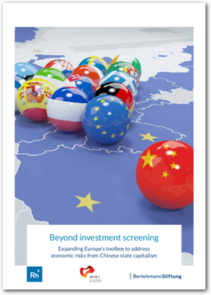A new study explores how Europe could expand its toolbox to address economic risks from Chinese state capitalism.
The European Union (EU) and China have entered a new stage in their relationship. China now appears as an “systemic competitor” or even “systemic rival” in assessments by major European business federations and EU institutions, and the EU Commission has launched a work program to assess ways to deal with the country’s economic impact on the EU. There is a growing belief across Europe that the balance of challenges and opportunities China presents has shifted, and that European policy-making needs to adapt to new long-term challenges arising from the competition between economic systems.
Underpinning this reassessment is a recognition that core elements of China’s economic policy continue to be fundamentally different from market-oriented principles and practices in the OECD world. These principles include the promotion of open and competitive markets, effective price systems, and clear boundaries for state interference in the economy. Europe’s permissive stance thus far was contingent on Chinese convergence with such liberal economic norms; and adjustment was the general trend in China after 1978. But in recent years, the trend has become less clear. Unless major reform steps are taken soon, the view that China under Xi Jinping is diverging with advanced economy norms will be entrenched. Given China’s size and weight in global product and service markets, its reversion to statist economic strategies (or even sluggish progress toward more liberal approaches) will have direct and increasing impacts on the sustainability of Europe’s system.
Europe’s policy instruments will need to be adapted to this new reality. Trade competition implications can be grappled with trade policy tools (though with limited efficiency), and the national security consequences of direct investment have been tagged for stepped-up screening at the border. But this leaves much unaddressed.
This report, prepared by the Mercator Institute for China Studies and Rhodium Group, takes stock of defensive measures in competition, anti-subsidy, public procurement and related policy fields that could help Europe deal with market distortions spilling over through growing Chinese investment and other commercial linkages with Europe. The report was initially drafted and circulated as a discussion paper for the 2019 Ziethen China roundtable, jointly organised by Bertelsmann Stiftung and the Federation of German Industries (BDI).
The “China challenge” is just one issue in an emerging debate about the need for a revision of Europe’s competition and industrial policies. Given the stakes, the discussion has the potential to become politicized and counter-productive. In order to identify impactful and cost-effective solutions to promote and defend Europe’s ability to compete, current issues will need to be assessed objectively. This report contributes to framing the current debate by distinguishing between three critical yet sometimes entangled or competing policy objectives: (1) An effort to preserve free and healthy market competition in the EU in the interest of EU consumers;
(2) A producer-oriented drive to promote a level global playing field for European firms; (3) A desire to maximize the long-term competitiveness of European companies, including through new forms of industrial policy.
As EU member states and the Commission think about new policy instruments, this report argues that Europe should be cautious to avoid the non-market practices it objects to abroad. Europe’s response needs to be first and foremost a positive agenda for member states and EU institutions to enable a thriving market environment that fosters innovation and growth. Policy responses should advance a robust liberalism that avoids damaging competition policies and market principles that have been the regulatory workhorses of most OECD market economies for decades.

